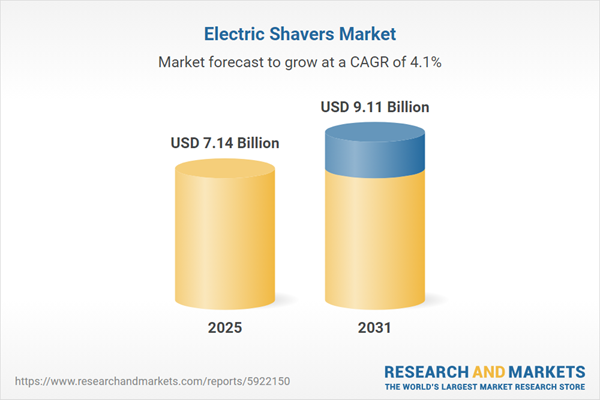Speak directly to the analyst to clarify any post sales queries you may have.
10% Free customizationThis report comes with 10% free customization, enabling you to add data that meets your specific business needs.
However, market growth faces significant hurdles due to the widespread availability of inexpensive counterfeit products, which damage consumer confidence and weaken the pricing leverage of established brands. To demonstrate the industry's stability in major regions, the ZVEI reported that turnover for small domestic appliances in Germany - a key personal care category - rose by 4% to reach 3.9 billion Euro in 2024. Despite such regional resilience, the abundance of unauthorized replicas continues to act as a major obstacle to maximizing global revenue, particularly in markets where price sensitivity is high.
Market Drivers
The incorporation of artificial intelligence and smart sensing technologies is transforming the Global Electric Shavers Market by fulfilling consumer desires for customized and gentle grooming solutions. Manufacturers are actively integrating intelligent sensors that assess hair density and adjust blade velocity instantly, thereby reducing skin irritation and improving cutting effectiveness. This shift toward high-tech premium products motivates consumers to switch from manual or basic models to advanced tools, maintaining revenue streams even during economic shifts. The financial success of this approach is reflected in Royal Philips' 'Q2 2025 Quarterly Report', which noted a 6% rise in comparable sales for its Personal Health division, a growth trend specifically credited to the introduction of new AI-driven products.At the same time, the broadening of global e-commerce channels acts as a vital driver for market reach, enabling brands to overcome traditional retail limitations and access a larger customer base. By utilizing direct-to-consumer sites and third-party marketplaces, manufacturers can exploit digital marketing and data analytics to effectively target specific consumer groups. This transition is supported by strong digital performance figures; Procter & Gamble's '2025 Annual Report' revealed a 12% increase in e-commerce sales, which now make up 19% of total enterprise revenue. This digital expansion is underpinned by substantial manufacturing capabilities, as evidenced by the China Household Electrical Appliances Association's 2025 report, which cited cumulative home appliance exports of $112.42 billion in the previous year, highlighting the massive supply chain supporting both online and offline retail.
Market Challenges
The widespread presence of inexpensive counterfeit merchandise presents a significant obstacle to the growth of the Global Electric Shavers Market. These unauthorized copies frequently imitate the appearance of reputable brands but generally employ inferior components, resulting in lackluster performance and potential safety risks for consumers. When buyers unknowingly acquire these substandard items, their dissatisfaction often tarnishes the reputation of authentic manufacturers, undermining the brand value that sustains premium pricing structures. Consequently, legitimate companies are compelled to reallocate substantial funds from research and development to brand protection initiatives, which hampers innovation and stalls market value appreciation.The magnitude of this problem directly hinders revenue generation in critical markets. Data from the Personal Care Products Council indicates that during fiscal year 2024, United States authorities confiscated over 500,000 counterfeit personal care products, placing them among the most frequently intercepted goods. This massive influx of illicit trade floods the market with non-compliant devices, creating a challenging environment for authorized brands to compete successfully and maintain volume growth, especially in regions where consumers are highly price-sensitive.
Market Trends
The shift toward eco-friendly materials and sustainable packaging is quickly becoming a key competitive factor in the electric shavers market, influenced by stricter environmental laws and consumer demand for ethical manufacturing. Companies are progressively substituting virgin plastics with post-consumer recycled content and removing single-use materials from packaging to adhere to circular economy concepts. This strategic adjustment not only ensures alignment with international sustainability benchmarks but also bolsters brand loyalty among environmentally aware consumers. The significant impact of this operational change is highlighted by Royal Philips in its February 2025 '2024 Annual Report', where circular revenues accounted for approximately 24% of total sales, underscoring the increasing commercial importance of regenerative material usage and eco-design within the personal health industry.Simultaneously, the growing popularity of multifunctional and modular grooming tools is reshaping product development strategies, as customers increasingly prefer versatile, all-in-one solutions over single-function devices. In response, manufacturers are designing modular systems that accommodate facial styling, body grooming, and hair cutting via interchangeable accessories, offering enhanced utility and value per product. This integration of grooming capabilities enables firms to simplify their product lines while preserving healthy profit margins through premium "lifestyle" branding. The financial success of this diversified strategy is confirmed by Panasonic Holdings Corporation's May 2025 'Fiscal 2025 Financial Results', which reported an 8.2 billion yen increase in operating profit for its Lifestyle segment, proving the profitability and resilience of comprehensive consumer living solutions.
Key Players Profiled in the Electric Shavers Market
- Andis Co.
- Xiaomi Corp.
- Braun GmbH
- Conair Corp.
- Koninklijke Philips NV
- Panasonic Corp.
- The Procter and Gamble Co.
- Shanghai Flyco Electrical Appliance Co. Ltd.
- Wahl Clipper Corp.
- Wenzhou Iweel Electric Co. Ltd.
Report Scope
In this report, the Global Electric Shavers Market has been segmented into the following categories:Electric Shavers Market, by Product Type:
- Foil Shaver
- Rotary Shaver
- Wet/Dry Shaver
- Others
Electric Shavers Market, by Distribution Channel:
- Online
- Offline
Electric Shavers Market, by Region:
- North America
- Europe
- Asia-Pacific
- South America
- Middle East & Africa
Competitive Landscape
Company Profiles: Detailed analysis of the major companies present in the Global Electric Shavers Market.Available Customization
The analyst offers customization according to your specific needs. The following customization options are available for the report:- Detailed analysis and profiling of additional market players (up to five).
This product will be delivered within 1-3 business days.
Table of Contents
Companies Mentioned
The key players profiled in this Electric Shavers market report include:- Andis Co.
- Xiaomi Corp.
- Braun GmbH
- Conair Corp.
- Koninklijke Philips NV
- Panasonic Corp.
- The Procter and Gamble Co.
- Shanghai Flyco Electrical Appliance Co. Ltd.
- Wahl Clipper Corp.
- Wenzhou Iweel Electric Co. Ltd.
Table Information
| Report Attribute | Details |
|---|---|
| No. of Pages | 185 |
| Published | January 2026 |
| Forecast Period | 2025 - 2031 |
| Estimated Market Value ( USD | $ 7.14 Billion |
| Forecasted Market Value ( USD | $ 9.11 Billion |
| Compound Annual Growth Rate | 4.1% |
| Regions Covered | Global |
| No. of Companies Mentioned | 11 |









